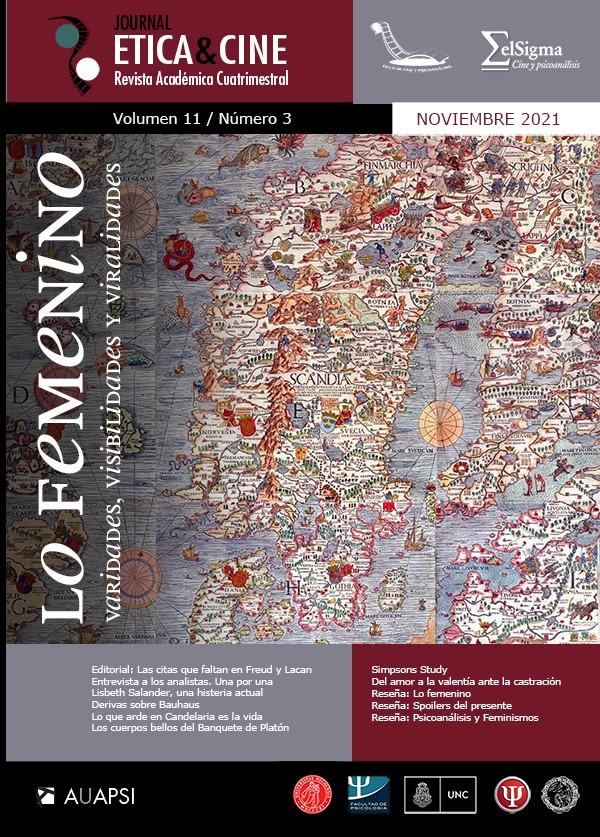From love as recognition, to courage in the face of castration
DOI:
https://doi.org/10.31056/2250.5415.v11.n3.35932Keywords:
femenism, desire, sexual difference, marriageAbstract
With his dictum “There is no sexual relationship”, Jacques Lacan places a structural disagreement that love illusory bet to make it possible. Supported in the passion for ignorance, for an instant this operation creates to the couple the ilussion that destiny made one to each other. George Cukor´s Adam´s rib raises the question about from where does the couple holds: if it is from mutual recognition in the level of sexual equality, of from the recognition of desire that introduces difference and lack. For Lacan, love is tested by facing castration. If in Cukor´s film, Amanda will put her husband to the test of offering his lack for love, she too will be put to the test by Adam to recognize that beyond the militancy of equal rights for women, it is required to admit in the erotic level a “tiny difference”. Difference that is not the same raised on an imaginary or on a real level. In the imaginary level, the admition renew the the cycle of separation and union of the couple to infinity, unless it is registered as a real lack that opens to a new form of love more cured from the passions of being. In this remarriage comedies, the copules go through the decision to choose each other twice, in a sort of inner eight topology, proper to an accomplished act: cutting the attachment to an object of joy that seal off castration, so as to relaunch love desire.
References
Cavell, S. (1999). La búsqueda de la felicidad. La comedia de enredo matrimonial en Hollywood. Paidós.
Baumbach, N. (director). (2018). Marriage story [película]. Heyday Films; Netflix.
Cukor, G. (director). (1949). Adam’s Rib [película]. Metro-Goldwyn-Mayer.
Freud, S. (1914). Introducción del narcisismo. Amorrortu.
Howard, M. (2014). Eat, Drink and Remarry: Confessions of a Serial Wife. Harlequin.
Ibsen, H. (director). (1879). Casa de muñecas [obra de teatro]. Teatro Real de Copenhague.
Lacan, J. (1959-1960). El Seminario, Libro VII, La ética del psicoanálisis. Paidós.
Lacan, J. (15 de enero de 1974). El Seminario, Libro 21, “Les non dupes errent”. Inédito.
Lacan, J. (1981). El Seminario Libro 20: Aún, Buenos Aires. Paidós.
Musachi, G. (2012). Mujeres en movimiento. Fondo de Cultura Económica.
Ritvo, J.B. (2019). El feminismo entre la política y el erotismo. Imago Agenda, (206).
Downloads
Published
Issue
Section
License
Copyright (c) 2021 Ética y Cine Journal

This work is licensed under a Creative Commons Attribution-ShareAlike 4.0 International License.
Los autores que publiquen en Ética y Cine Journal aceptan las siguientes condiciones:
Los autores/as conservan los derechos de autor © y permiten la publicación a Ética y Cine Journal, bajo licencia CC BY-SA / Reconocimiento - Reconocimiento-CompartirIgual 4.0 Internacional. La adopción de esta licencia permite copiar, redistribuir, comunicar públicamente la obra, reconociendo los créditos de la misma, y construir sobre el material publicado, debiendo otorgar el crédito apropiado a través de un enlace a la licencia e indicando si se realizaron cambios.

Este obra está bajo una licencia de Creative Commons Reconocimiento-CompartirIgual 4.0 Internacional.




